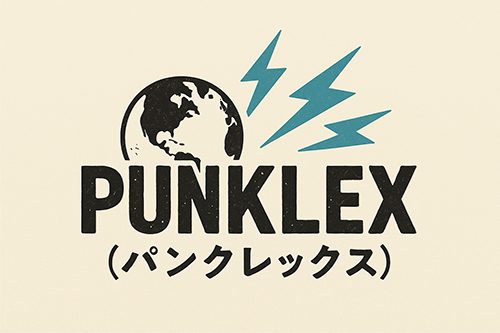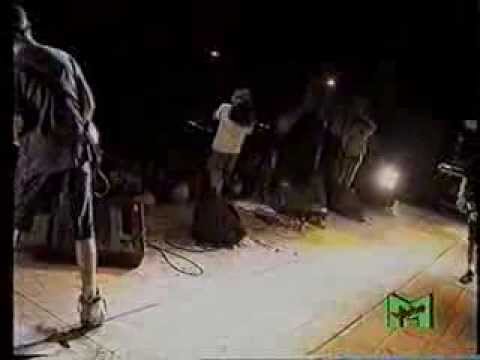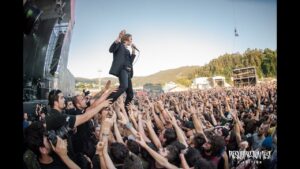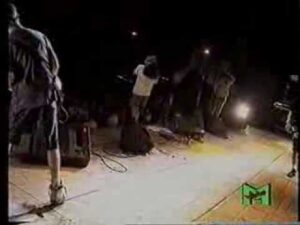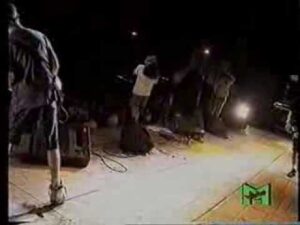Formation & Members
Negazione, known in their native Italian as “Negazione” and often stylized in Japanese as “ネガティヴ,” emerged from the vibrant punk and hardcore scene of Turin, Italy, in 1983. The band’s formation was driven by a shared desire to express discontent and a passion for the raw energy that punk music encapsulates. The original lineup featured Guido Sassola, known as “Zazzo,” on vocals, along with Marco Mathieu on bass, Roberto “Tax” Farano on guitar, and Fabrizio Fiegl on drums. Over the years, the lineup experienced several changes, but Zazzo and Tax remained as the core driving forces behind the band’s sound and ethos.
Musical Style & Characteristics
Negazione’s music is a powerful blend of punk, hardcore, and metal elements, characterized by its fast tempos, aggressive rhythms, and intense vocal delivery. Their sound is often noted for its melodic undertones, which distinguish it from some of the more abrasive acts in the hardcore scene. The band’s lyrics, primarily in Italian, convey themes of resistance, existential angst, and a critique of societal structures, resonating deeply with both local and international audiences. Zazzo’s vocal style is particularly distinctive, combining raw energy with a melodic sensibility that enhances the emotional impact of their songs.
Key Works & Discography
Negazione’s discography is a testament to their evolution as a band and their influence on the punk and hardcore scenes. Their first major release, “Mucchio Selvaggio” in 1984, quickly gained attention for its sheer intensity and authenticity. This was followed by the seminal album “Lo Spirito Continua” in 1986, which is often hailed as a classic within the genre, showcasing their growth as musicians and songwriters.
In 1987, the band released “Little Dreamer,” which continued to push the boundaries of their sound. Their 1989 album “100% Negazione” further solidified their place in hardcore punk, characterized by its polished production and more complex song structures. The band’s final studio album, “Tutti Pazzi” in 1991, encapsulated their journey and hinted at their eventual disbandment. Each of these works contributed to building a legacy that would influence countless other bands.
Influence on Other Bands/Scenes
Negazione’s influence extends far beyond Italy, impacting punk and hardcore bands across Europe and even reaching into South America and Japan. Their ability to blend melodic elements with hardcore intensity inspired a generation of bands looking to expand the genre’s boundaries. Bands such as Raw Power and Indigesti from Italy, as well as international acts like Refused from Sweden, have cited Negazione as a major influence. The band’s DIY ethic, combined with their relentless touring, helped to foster a sense of community within the punk scene, encouraging other bands to take a similarly independent approach.
Breakups or Reunions
Despite their success and influence, Negazione’s journey was not without its challenges. Internal tensions and the pressures of constant touring eventually led to the band’s breakup in 1992. The split was amicable, with members pursuing different paths in music and other ventures. Over the years, there have been sporadic talks and rumors about potential reunions, but as of now, the band has not officially reformed. However, individual members have occasionally collaborated on musical projects, keeping the spirit of Negazione alive in various forms.
Current Reputation & Legacy
Today, Negazione is regarded as one of the most important bands to emerge from Italy’s hardcore scene. Their music continues to resonate with young and old audiences alike, appreciated for its raw emotional power and melodic depth. The band’s discography remains in circulation, with reissues bringing their classic works to new audiences. Negazione’s impact is particularly evident in the way contemporary punk and hardcore bands embrace a more melodic approach while maintaining the genre’s inherent aggressiveness.
The band’s legacy is also preserved through various documentaries and books that chronicle their influence on the punk scene and their role in shaping Italian alternative music. Festivals and tribute shows frequently celebrate their contribution, ensuring that their music and message endure.
Conclusion
Negazione’s journey is a testament to the power of punk music to transcend cultural and linguistic barriers. From their formation in the early 1980s to their dissolution in 1992, the band crafted a body of work that continues to inspire and influence musicians worldwide. While they may no longer be an active force in the music scene, Negazione’s legacy lives on through their recordings and the countless bands they have inspired. As a symbol of resistance and creative expression, Negazione remains an integral part of the punk and hardcore tapestry, their spirit echoing in the chords of every new generation of musicians who dare to dream and defy.
